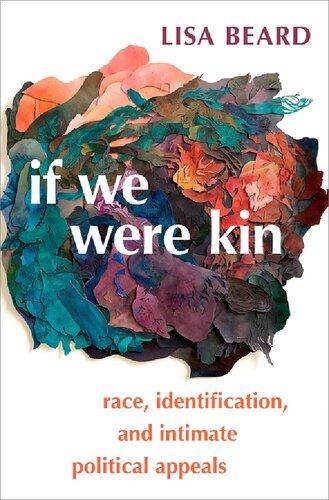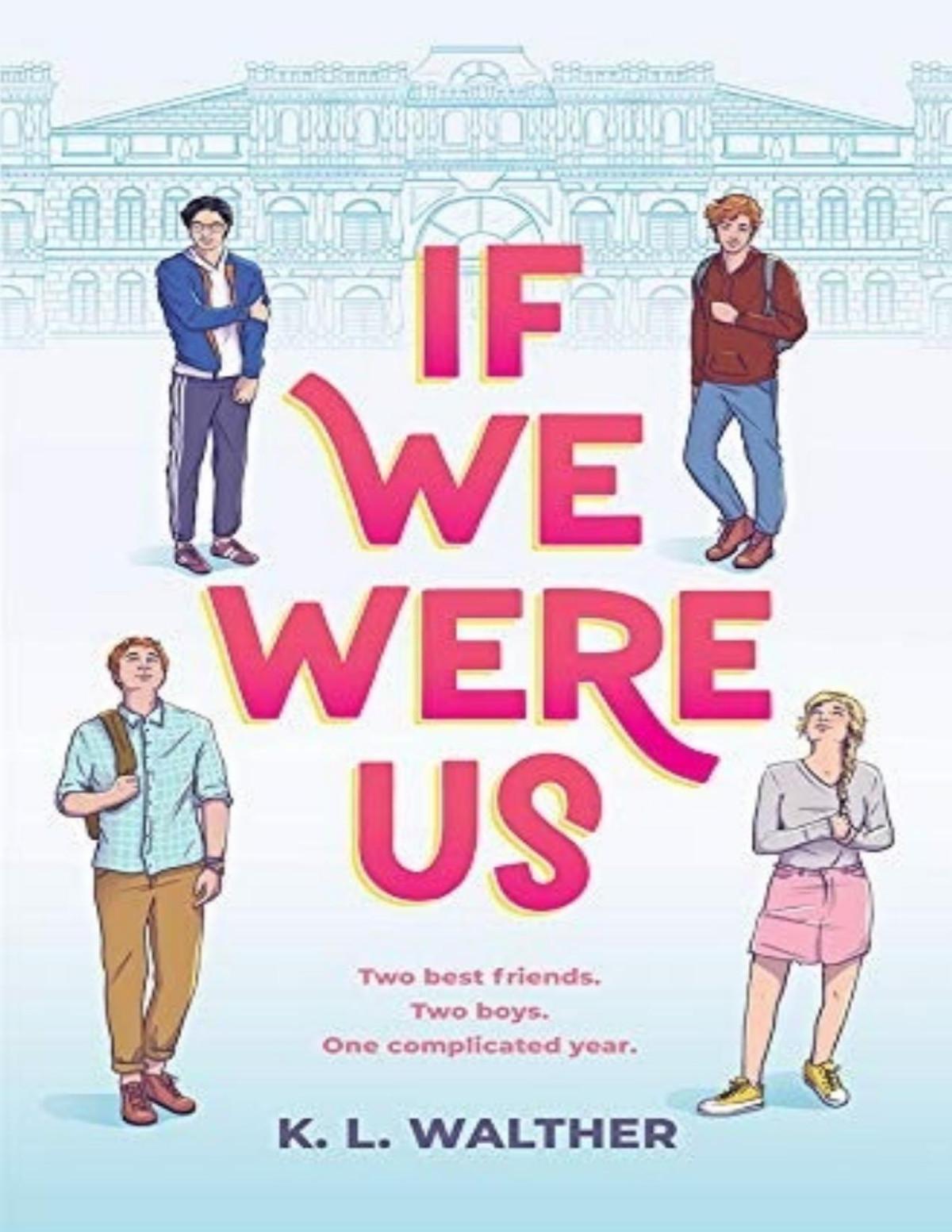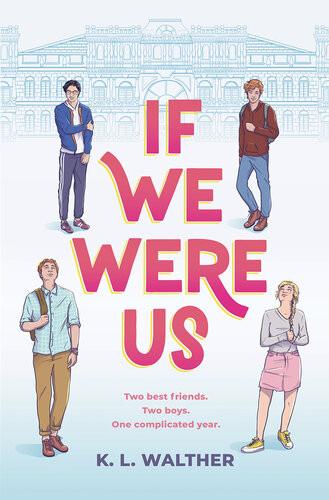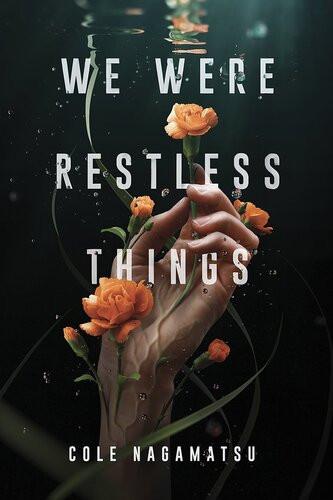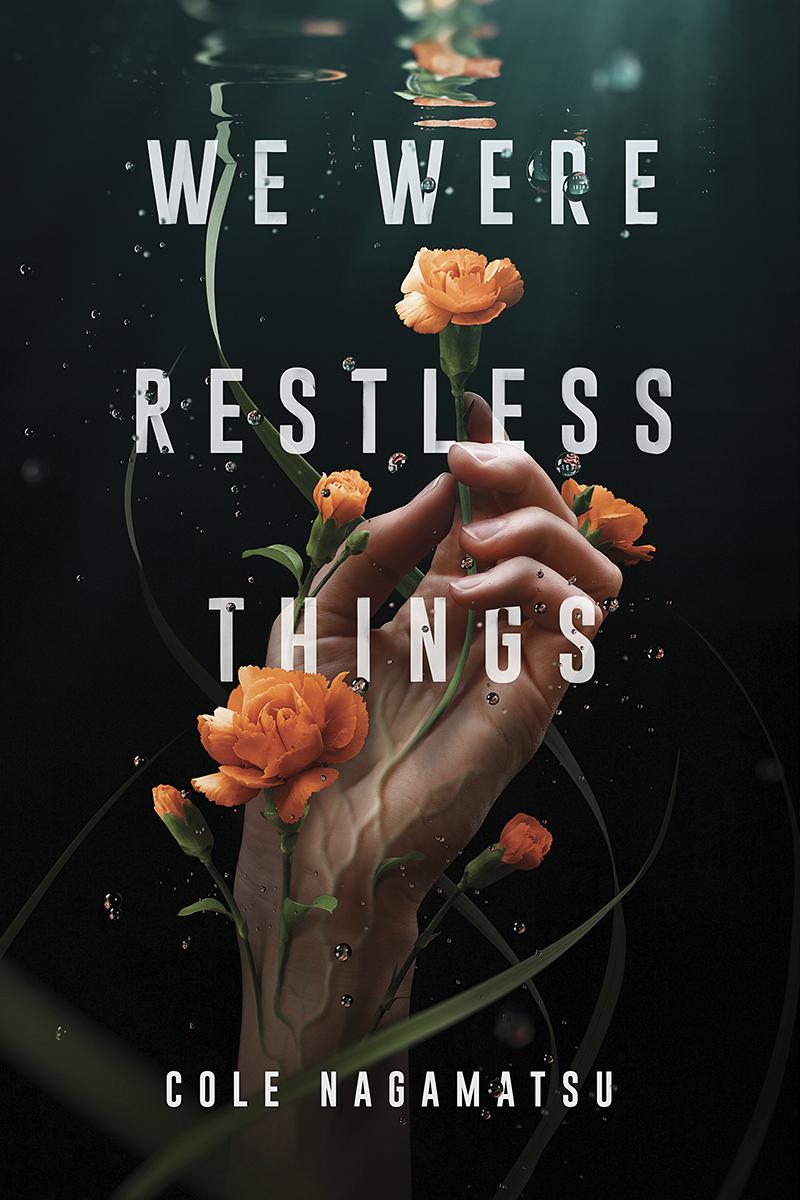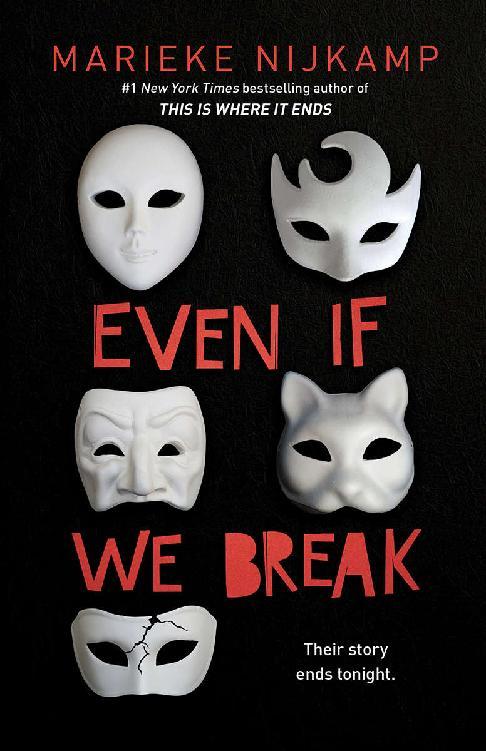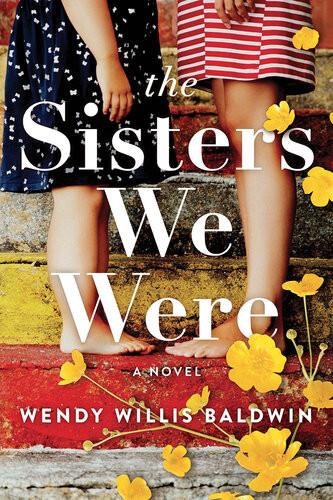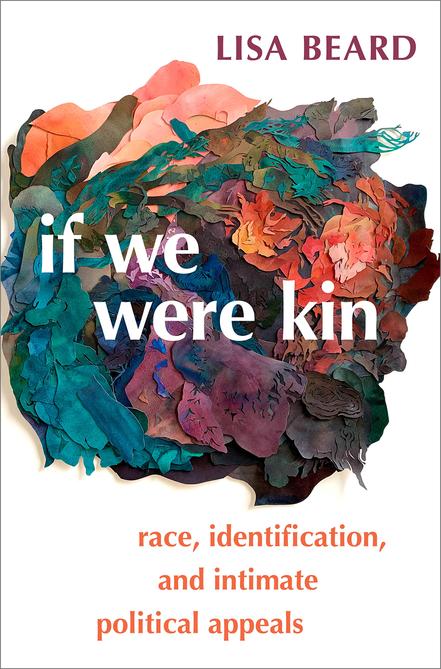If We Were Kin: Race, Identification, and Intimate Political Appeals Lisa Beard
Visit to download the full and correct content document: https://ebookmass.com/product/if-we-were-kin-race-identification-and-intimate-politica l-appeals-lisa-beard/
More products digital (pdf, epub, mobi) instant download maybe you interests ...
If We Were Us K. L. Walther
https://ebookmass.com/product/if-we-were-us-k-l-walther/
If We Were Us 1st Edition K. L. Walther
https://ebookmass.com/product/if-we-were-us-1st-edition-k-lwalther/
If She Were Dead Smith J.P
https://ebookmass.com/product/if-she-were-dead-smith-j-p/
After We Were Stolen Beyfuss
https://ebookmass.com/product/after-we-were-stolen-beyfuss/
After We Were Stolen Brooke Beyfuss
https://ebookmass.com/product/after-we-were-stolen-brookebeyfuss/
We Were Restless Things Cole Nagamatsu
https://ebookmass.com/product/we-were-restless-things-colenagamatsu-2/
We Were Restless Things Cole Nagamatsu
https://ebookmass.com/product/we-were-restless-things-colenagamatsu/
Even If We Break Marieke Nijkamp
https://ebookmass.com/product/even-if-we-break-marieke-nijkamp/
The Sisters We Were Wendy Willis Baldwin
https://ebookmass.com/product/the-sisters-we-were-wendy-willisbaldwin-2/
If
We Were Kin
If We Were Kin
Race, Identification, and Intimate Political Appeals
LISA BEARD
Oxford University Press is a department of the University of Oxford. It furthers the University’s objective of excellence in research, scholarship, and education by publishing worldwide. Oxford is a registered trade mark of Oxford University Press in the UK and certain other countries.
Published in the United States of America by Oxford University Press 198 Madison Avenue, New York, NY 10016, United States of America.
© Oxford University Press 2023
The epigraph in Chapter 2 is reprinted with permission from The James Baldwin Estate
All rights reserved. No part of this publication may be reproduced, stored in a retrieval system, or transmitted, in any form or by any means, without the prior permission in writing of Oxford University Press, or as expressly permitted by law, by license, or under terms agreed with the appropriate reproduction rights organization. Inquiries concerning reproduction outside the scope of the above should be sent to the Rights Department, Oxford University Press, at the address above.
You must not circulate this work in any other form and you must impose this same condition on any acquirer.
Library of Congress Cataloging-in-Publication Data Names: Beard, Lisa, author.
Title: If we were kin : race, identification, and intimate political appeals / Lisa Beard.
Description: New York, NY : Oxford University Press, [2023] | Includes bibliographical references and index.
Identifiers: LCCN 2022058426 (print) | LCCN 2022058427 (ebook) | ISBN 9780197517338 (hardback) | ISBN 9780197517321 (paperback) | ISBN 9780197517352 (epub) | ISBN 9780197517345 | ISBN 9780197517369
Subjects: LCSH: Political science—United States—Philosophy. | Kinship—Political aspects—United States. | Identity politics—United States. | Race relations—Political aspects—United States. | Sexual minorities—Political aspects—United States. | Political sociology—United States.
Classification: LCC JA71 .B4134 2023 (print) | LCC JA71 (ebook) | DDC 320.01—dc23/eng/20221223
LC record available at https://lccn.loc.gov/2022058426
LC ebook record available at https://lccn.loc.gov/2022058427
DOI: 10.1093/oso/9780197517338.001.0001
Paperback printed by Marquis, Canada
Hardback printed by Bridgeport National Bindery, Inc., United States of America
1. “For Your Gay Brothers and Your Gay Sisters in Jail”: Sylvia Rivera’s Countercall
2. “Flesh of Their Flesh, Bone of Their Bone”: James Baldwin’s Kinship Politics
3. “You Have to Hear What’s Being Said to You”: Hansberry and Horne’s Interruption
Interlude: “My Friends, These People Are Our People”: Pat Buchanan’s Nostalgic and Demonological Appeals
4. “Igniting the Kindred”: Southerners On New Ground’s
“Remember That Feeling Because It’s the Same Cage”: Appeals to Boundness
Acknowledgments
My deepest thanks to the race and gender justice and queer and trans liberation activists whose world-making work and whose political visions and freedom dreams are at the heart of this book. I am grateful to Southerners On New Ground organizers for meeting with me on front porches, in coffee houses, at Gaycation, and in feminist bookstores. Special thanks to Caitlin Breedlove for accompanying me in the archives in Durham, Mary Hooks for her support in late stages of the project, and Pat Hussain and Serena Sebring for speaking with me about drafts of chapter 4.
My graduate mentors on my dissertation committee opened their office doors to countless hours of conversations, and they shepherded my project on its own terms, creating wide space for its shape to emerge rather than imposing conventional frameworks or tidy closures. Joe Lowndes and Dan HoSang have been incredible co-advisors. Joe traveled with me through so many of the richest theoretical and historical dimensions of this project, and in our conversations always draws out what’s at the heart of my work. I’m constantly learning from the ways Dan stays close to what is at stake politically in a project, and I leave each of our meetings with the title of another amazing book in my hands. Ernesto Martínez’ mentorship, warmth, and how he has slowed down with my writing and close readings has been an extraordinary gift. My work has been distinctly shaped by conversations with Alaí Reyes-Santos about kinship, solidarity, and political community. Priscilla Yamin has been a brilliant guide as I developed my historical analysis of late twentieth century race and gender politics.
Enormous gratitude to Tiffany Willoughby-Herard belongs across so many paragraphs of these acknowledgments, for her exceptional feedback on every chapter, her mentorship and friendship, and her visionary changemaking work.
A Chancellor’s Postdoctoral Fellowship at UC Riverside provided invaluable research support and intellectual community. I am deeply indebted to my fellowship mentor Bronwyn Leebaw for her amazing support, co-thinking, and generative feedback as I pivoted from dissertation to book. Special thanks also to Farah Godrej, Francisco Pedraza, the UCR Political Science
and Ethnic Studies Departments, Kimberly Adkinson, Mark Lawson, and the intergenerational Presidential and Chancellor’s Postdoctoral Fellowship community across the UCs. I am extremely grateful to Tiffany WilloughbyHerard, Shana Redmond, Chip Turner, Melvin Rogers, and Mark Golub for traveling to Riverside to participate in, and to Bronwyn Leebaw for convening, an incredible day-long manuscript workshop. It was one of the most memorable days in the journey of this book.
This project received generous research support from the Wayne Morse Center for Law and Politics Dissertation Fellowship; the Center on Diversity and Community; the Center for the Study of Women and Society; the Department of Indigenous, Race, and Ethnic Studies; and the Department of Political Science at the University of Oregon; as well as from the Future of Minority Studies Research Project; UC Riverside’s Chancellor’s Postdoctoral Fellowship Program; and Western Washington University’s College of Humanities and Social Sciences and Office of Research and Sponsored Programs.
It was a gift to work with the exceptional archivists and librarians at the Schomburg Center for Research in Black Culture; the Manuscripts and Archives Division of the New York Public Library; the Sallie Bingham Center for Women’s History and Culture at Duke University; the LGBT Community Center’s National History Archives; the Lesbian Herstory Archives; the John F. Kennedy Presidential Library Archives; and the Oregon Shakespeare Festival Archives. Special thanks to Cheryl Beredo, Natiba Guy, Caitlin McCarthy, Tal Nadan, Alison Quammie, and Kelly Wooten.
It has been a joy to work with Angela Chnapko and Alexcee Bechthold at Oxford University Press. I thank Angela for her clear eyes on my project since our first meeting. I am indebted to Annie Menzel and an anonymous reviewer for their incredibly generative feedback on the manuscript. Special thanks to Alexandra Chiou for permission to print her exquisite art on the book cover. An earlier version of chapter 2 appeared Contemporary Political Theory 15, no. 4 (2016), and I thank Sam Chambers and the reviewers for their helpful comments.
For hosting presentations of parts of this project, warm thanks go to Vilna Bashi Treitler, Pei-te Lien, and Roberto Strongman and the Departments of Black Studies and Political Science at UC Santa Barbara; Catherine Ceniza Choy and the Department of Ethnic Studies at UC Berkeley; Susan McWilliams and the Department of Political Science at Pomona College; Bronwyn Leebaw and John Medearis at UC Riverside’s
Department of Political Science; Joshua Dienstag and the UCLA Political Theory Workshop; and Miriam Abelson and the Department of Women, Gender, and Sexuality Studies at Portland State University. Thanks to Lynn Fujiwara, Tiya Miles, and the Department of Indigenous, Race, and Ethnic Studies at the University of Oregon for engaging an earlier version of chapter 2 at the Peggy Pascoe Memorial Lecture graduate paper workshop. I’ve received excellent feedback on this project and ongoing inspiration from colleagues in the National Conference of Black Political Scientists; the Western Political Science Association; the American Studies Association; the American Political Science Association; the Caribbean Philosophical Association; the National Women’s Studies Association; the Critical Ethnic Studies Association; and the Politics of Race, Immigration, and Ethnicity Consortium.
My research and writing group of the past five years has read chapter drafts with precision and care—thank you to Tiffany Willoughby-Herard, Jeanne Scheper, Khanum Shaikh, LaShonda Carter, Deshonay Dozier, Salvador Z árate, Natalia Molebatsi, and everyone from earlier years, especially Jasmine Syedullah, April Jackson, Kat Cosby, and Gabriela Corona. Warm thanks also to Miriam Abelson, Lawrie Balfour, Natasha Behl, Eva Bertram, Anita Chari, Anand Commissiong, Heath Fogg Davis, Alfonso Gonzales, Cory Gooding, Zachary Hicks, Vicki Hsueh, Murad Idris, Mzilikazi Koné, James Martel, Lida Maxwell, Desireé Melonas, Zein Murib, Joshua Plencner, Heather Pool, Anna Sampaio, George Shulman, Dean Spade, Courtney Thorsson, Chithira Vijayakumar, Nancy Wadsworth, and Jasmine Noelle Yarish for their feedback on different parts of this project. Thank you also to Nic Francisco, Stefanía García, Anne Huffman, Aylie Baker, Jed Walsh, and Ariel Powell-Córdova. I am grateful to Laura Holliday and Berkeley Goodloe at Academic Writers Studio for their support, with special thanks to Laura for her outstanding editorial guidance.
Warm thanks to Ginetta Candelario, Greg White, Randy Bartlett, Heather Andrea Williams; and to Vicki Spelman and Albert Mosley and the Kahn Institute at Smith College. At the University of Oregon, special thanks go to the Departments of Political Science and Indigenous, Race, and Ethnic Studies, and especially to Erin Beck, Gerald Berk, Anita Chari, Charise Cheney, Donella Elizabeth-Alston Cleveland, Chris Finley, Lynn Fujiwara, Alison Gash, Michael-Hames García, Jason Schreiner, and my graduate student friends. At Western Washington University, I thank my colleagues in the Political Science Department for their welcome and support, as well as
Acknowledgments
Dharitri Bhattacharjee, Josh Cerretti, Stefania Heim, Litav Langley, Peter Pihos, and Theresa Warburton.
The questions and dreams at the heart of this project grew out of community organizing, and I am indebted to the organizers, community health workers, and artist-activists who have taught me, with special thanks to the Slim Buttes Agricultural Project, Black Mesa Water Coalition, Challenging White Supremacy Workshop, East Bay Saturday Dialogues, Catalyst Project, and the Center for Transformative Change. My thinking has also been shaped by living in community, and I thank my co-operative housemates over the years for their activism and world-making.
Special thanks go to Mez Baker-Médard, Laura Burfoot, Lynelle Gamage, Sarah Barnard, Naunau Baker-Médard, Amrit Gupta, Tigre Lusardi, Urooj Mughal, Steph Thurman-Moore, Lydia Van Dreel, Mia Villanueva, Amanda Blaine, Olivia Corson, and other dear friends and chosen family—many of them named earlier in these acknowledgments—who have sustained and inspired me across the years of this project. I thank my lucky stars I had the brilliant cowriting companionship of Desireé Melonas and Jasmine Syedullah while I completed revisions. Gratitude to my extended family, my brother, Jamie, and my dad, the late John Beard. Special thanks to my mom, Liz Beard, whose enthusiasm and support throughout the years of this project has been immeasurable. Finally, I cannot adequately thank my partner, Scott, for spending countless hours reading and talking through the pages of this book and for accompanying me in this process with so much love.
Introduction Intimate Appeals
Over five decades of organizing and building a political community across lines of race, region, class, and educational background, Ella Baker was known to ask nearly everyone she met the question, “Who are your people?”1 As Barbara Ransby explains, when Baker invoked this question she meant it not only in geographic terms—Where do you come from?—but also in political terms—“Who do you identify with? When you have to take sides, where do you stand and who will be there with you?” As recorded by Ransby, Baker’s question “Who are your people?” works as a provocation, a methodology of identification. Her capacious question holds together one’s origin story (“Where do you come from?”) together with a less fixed conceptualization of our identifications that is about who we choose to stand with (“When you have to take sides, where do you stand and who will be there with you?”).
This book is about how people politically come to understand who they are, what are their interests, and how they are connected to others. It is about the we of politics, and how that we is made. How it is fought over. How it is remade. And why these struggles and processes matter to politics. More than matter how they are at the very core of questions about power and political change.
Reigning frameworks in the study of politics—including notions of coalition building, interest groups, alliances, or instrumental politics of rhetorical persuasion—leave forms of identification sedimented in the background as a priori identities or prop them up front as a part of a mechanistic and calculated game. In both cases we are left with constrained accounts of our political world. Political identification cannot be captured by these frameworks and is a far more significant and profound political process than they allow. Identification is not a backdrop or explanatory variable—it is a phenomenon that deeply shapes the political world and is, itself, a primary object of contestation. Political actors from presidential candidates to grassroots organizers invest tremendous effort in crafting and contesting forms of identification
If We Were Kin. Lisa Beard, Oxford University Press. © Oxford University Press 2023. DOI: 10.1093/oso/9780197517338.003.0001
and summoning people into identifying in certain ways. What is at stake in their appeals is the possibility of changing or upholding relationships of power.
Although this book stakes a wider claim about the centrality of identification to politics, I am especially after its deeper registers, and the attempts by political actors like Baker to get people to shift or reshape their foundational identifications. Specifically, these are appeals animated by a concept I call boundness, reconceiving the lines of relationship between self and other in ways that challenge the atomized and hierarchical gendered and sexualized racial formations that constitute political life in the United States. Boundness posits that lived conditions of violence and possibilities of freedom are coconstituted across lines of power and difference.
Appeals to boundness constitute a distinct lineage within the wider field of identificatory appeals in U.S. political culture. In different articulations, the concept can be traced across Maria Stewart’s antislavery speeches, through Frederick Douglass’ writings and Ida B. Wells’ antilynching activism, and against the rise of the “race relations” paradigm in the twentieth century on into the contemporary moment. Boundness is deployed through an identifiable set of rhetorical strategies, including kinship language or language of my people, visceral appeals, compressions of space and time, and certain articulations of American national identity. As an alternative political ethos, boundness has been invoked in antiracist politics for over two centuries as an invitation, an ethic, a description of conditions, a philosophical provocation, and a form of address. Such appeals aim to trouble forms of historical amnesia and to provoke shifts in identification. In their appeals, political thinkers do not collapse but center difference and conditions of violence— mining the texture of difference in the structures of violence in which we live for an account of how we are connected.
Through their invocations of boundness, the primary actors in this book are doing more than trying to get people to recognize that their freedoms are “linked”: their appeals generate and call people into sharing an idea of what freedom even is. They challenge us to face disavowed relationships and reimagine new forms of being together politically. It is an intimate politics that centers the historical relationships of violence and lays claim to a different future. When James Baldwin invokes boundness in the 1960s, for example, he does not simply tell white people that they cannot be free unless Black people are free—he tells them they must understand precisely how they are connected to Black people and how they are constituted by histories of
anti-Black violence. He tells them that they cannot be free unless they both confront and forfeit their white identity because that identity is predicated on violence and willful unknowing. They must, Baldwin says, give up safety for life.2
The thinkers and actors centered in the four main chapters of this book stand within traditions of Black, Latinx, and queer and trans of color political thought and political action, and the context of their appeals is a late twentieth–early twenty-first-century contested America. Their interventions not only demand a rethinking of fundamental assumptions in the study of politics but also provide critical resources for understanding the way power works in struggles to constitute a we, how commitments toward or away from racial justice politics are cultivated through battles over identification, and the dangers and possibilities that inhere in identificatory appeals. And, most importantly, their appeals advance powerful visions of reoriented political relationships rooted in mutuality and shared freedom.
Political Identification
Tarso Luís Ramos, executive director of Political Research Associates (PRA), a social justice think tank that has monitored the right wing for four decades, addressed a group of rural organizers in a church hall in eastern Oregon in the summer of 2017. The people in the audience that day were involved in struggles for racial, environmental, and immigrant justice across the state, many of them traveling from locales impacted by a growing militia presence, white supremacist organizing, escalating ICE raids, and depressed resource-extractive economies. A long-term movement strategist and investigative researcher, Ramos was well acquainted with this particular region and a number of the organizers, having worked at the Western States Center for twelve years before starting at PRA.3 In his remarks, Ramos charted out some of the political landscape between the Reagan years and the contemporary moment and explained that his organization’s purpose of monitoring and studying organized right-wing groups is “not to vilify the people who organize into [those groups], but to understand them, and to compete for those people.”4 When Ramos describes the work of competing for those people, he is naming the struggle to lay claim upon people’s identificatory attachments, to compete for, as he put it, their “hearts and minds”—and to win.5
Ramos is mapping out a project in political identification—an interpretive battle waged, in this case, against right-wing organizers over the question of how and with whom different people will identify, a political struggle to call people into a way of understanding who they are, how they are connected to others, and what politics they are beholden to. Ramos was not proposing that progressive organizers attempt to call militia leaders into identification, but that they try to win the identifications of people who are being summoned by those leaders. Many liberals, Ramos explains, would cast aside those being summoned by the Far Right as “stupid and ignorant”—a response Ramos argued is not only “absurd and disgusting” but also “an excuse to not do the work” of trying to call them into identification with a different kind of politics. I take Ramos’ statements as a point of departure to introduce three key dimensions of political identification central to this study.
First, identification is a political process in motion across place and time. In contrast to political science research that begins studies with identification and then asks about behavior, forms of identification are better understood as a product of politics—as being forged through political conflict.6 Forms of identification can be deep or transitory, long-lasting or fleeting. Their structures are not predetermined, but constructed, multiple, and overlapping. They can be won or lost, sustained or abandoned. Those that seem well established or seem to rest on “natural affinities” have in fact been forged slowly over time in discursive processes through which otherwise disparate elements are sutured together into “associative chains.”7 Similarly, new forms of identification are constructed by pulling together existing ones and suturing them together in new combinations of meaning and political commitments.8 As Stuart Hall shows, an emergent Black identity in Great Britain in the 1970s and 1980s came to “provide the organizing category of a new politics of resistance, among groups and communities with, in fact, very different histories, traditions and ethnic identities.”9 “The black experience” became a unifying identificatory framework, but one that did not erase ethnic and cultural differences. Ruth Wilson Gilmore has called this a “bottom-up politics of recognition” and observed it at an environmental justice and anti-prison conference in California in 2001 that bridged rural and urban organizing. Instead of describing the cooperation at the conference as “multicultural organizing” (a familiar lens or lexicon), she interprets it as a “syncretic rescaling of identity”—it was not just discrete groups coming together, but people came to recognize themselves and each other in a new way.10 These cases cannot sufficiently be interpreted through the lens of a
coalition or alliance—instead, political actors are themselves changed as they enter new constellations of political community and take on new forms of identification.11 In part, these new forms of identification are constituted by visions for the future and through the processes of creating those visions. Tarso Luís Ramos, for example, invoked forms of identification rooted not in shared experiences or shared policy goals but in aspirations and visions of what might be possible.
Second, forms of identification matter politically because they concern the ways people recognize each other and how they affiliate or align themselves in political community. This is the question of the we of politics. When Gilmore explains that “organizing is always constrained by recognition,” she means that political organizing is constrained by whether people can recognize and identify with each other and with a political agenda in some way.12 Organizing is, she says, “constrained by people’s practices of identification, fluidly laden with differences and continuities of characteristics, interests, and purpose through which they contingently produce their individual and collective selves” (emphasis added). As such, activism “always begins with the politics of recognition.”13 As I will explain more in chapter 4, this is not state recognition but a different genealogy of recognition politics that is about recognition of self and other.
In this way, forms of identification are relational. Identifications are identifications with—for example, with groups, nations, institutions, ideas, political visions, family members, community members, public figures, and places.14 Taken together, forms of identification can be understood as relational orientations insofar as they are structured by their answer to the questions “Toward whom and what politics do I face and care for? From whom and from what politics do I turn away?” As Juliet Hooker explains, it is because we identify others as members of a community to which we also belong that we feel that we have obligations toward them.15 It thus matters greatly where and how lines of identification are drawn and on what terms. Indeed, the relationship between identification and care/responsibility has a pivotal place in the long history of race-making, racial violence, and racial justice struggles in the U.S. and elsewhere. Care and responsibility have been and continue to be distributed through terms of social life and social death, as in the making of blood kin into property in the context of slavery, the forging of white political community through imagined fraternity and constructions of white womanhood, or contemporary disavowals of the death-dealing structures of mass incarceration.16 The actors and political
thinkers centered in the main chapters of this book are engaged in political struggles over identification that seek to intervene in these structures of (gendered and sexualized) racialized violence and racist ideology. They labor to dismantle deadly allocations of care and concern and to establish reoriented relationships with others.
Third, and finally, identification is a political practice that works at both conscious and unconscious registers. On the one hand, to the extent that they are voluntary or conscious, forms of identification can be harnessed in political work through questions like Ella Baker’s “Who are your people?”—where there is potential through forms of political education or self-reflective practice to intentionally discard certain inherited identifications and to cultivate others. In ways that resonate with Baker’s question, feminist philosopher María Lugones calls for identifications to be practiced as a conscious and ongoing act, insisting that “we have to constantly consider and reconsider the question: Who are our own people?”17
Issuing her charge in Pilgrimages/Peregrinajes: Theorizing Coalition Against Multiple Oppressions, a book grounded in decades of grassroots organizing and popular education work, Lugones presents identification as a reflexive and iterative political practice of asking, answering, and re-asking this question.18 The endeavor is not to find one’s own people as if they are a preexisting formation awaiting discovery but to forge community through ongoing political praxis.19 On the other hand, one of the difficulties of harnessing identification in political projects is that identificatory processes are not entirely conscious or voluntary—they also work at unconscious registers and are not entirely up to our own choosing. Lugones’ and Baker’s questions attempt to make the process of identifying “our people” more active and conscious. Other appeals might answer rather than ask the question for their audience. These appeals (including a number of those centered in the chapters that follow) hide the contingency or uncertainty of their claims, telling people who they are rather than proposing to them how to identify.
Audre Lorde delineates a political practice that would arise from one’s answers to the questions raised by Baker and Lugones. In her 1982 address “Learning from the 60s” presented to the Harvard-Radcliffe Black Student Union, Lorde uses her own identifications as a site from which to theorize the relationship between who we call our people and how the answer to this question compels us to live differently. Lorde models/offers her listeners a reflexive practice:
I ask myself as well as each one of you, exactly what alteration in the particular fabric of my everyday life does this connection call for? . . . In what way do I contribute to the subjugation of any part of those who I define as my people? Insight must illuminate the particulars of our lives: who labors to make the bread we waste, or the energy it takes to make nuclear poisons which will not biodegrade for one thousand years; or who goes blind assembling the microtransistors in our inexpensive calculators?20
Lorde asks her audience to consider the ways they are, as Grace Kyungwon Hong puts it, “implicated in abandoning others to expendability.”21 Furthermore, Lorde tells us that the answer to the question “Who are your people?” only becomes substantive and meaningful with action, with “alter[ing],” the “particular fabric” of our everyday lives. Lorde performs identification not as an endpoint of a political practice but as something that is only made real through different kinds of inquiry and action. It is one thing to say who our people are, but that is empty until we change the way we live according to those webs of mutual care and concern.22 It is worth pausing here to distinguish between identity and identification. In short, the former is constituted by the latter—that is, political identity is made up of an assemblage of identifications and also, as I will show, disidentifications.23 These diverse elements are themselves shifting and, taken together, have contradictory implications that must be papered over for an identity to cohere. At the collective level, as Cristina Beltrán has explained, forms of political identity can be understood as “moment[s] when diverse and even disparate subjects claim identification with one another.” When Beltrán states that “Latino is a Verb” rather than a noun, she moves us into the terrain of political identity as something people “do” rather than something people “are.” Identification, over and above identity, lets us get to the more microlevel or constitutive processes of subjectification to discursive practices.24
Boundness and Intimate Political Appeals
Forms of political identification are forged and called into being through practices of political appeal. Political appeals are speech acts that work through the art and language of persuasion.25 They are discursive, emotional, and relational. An appeal itself does political work to constitute the status of
the claimant, the one to whom the appeal is addressed, and their relationship to each other.26 Identificatory appeals are speech acts meant to call people into forms of identification. In making these appeals, actors have to use what is available—including extant identifications, cultural reference points, ideas, histories, and imagined communities. They innovate, rework, recombine, and recirculate. The issuing of an appeal, though, is only one aspect of what is a relational practice. Will those summoned hear the call to identification? Will they receive it? Will they invest in the identification? As Hall explains, “the notion that an effective suturing of the subject to a subject-position requires, not only that the subject is ‘hailed,’ but that the subject invests in the position, means that the suturing has to be thought of as an articulation,” or, as Cristina Beltrán puts it, “an emotive and participatory encounter between subjects” rather than a one-sided process.27
Ultimately, we do not privately assemble our identificatory attachments. We are claimed and summoned. We are pushed away and excluded. Political actors, as Ramos put it, “compete” for people’s identifications, and they compete to set the shape and agendas of those identifications. They tell us who we are politically and, in doing so, call us into ways of being in the world. And it is not just activists who share political commitments with Ramos doing this— this is all part of a much broader political landscape in which different actors are staking competing claims and advancing alternative interpretations about what it means to identify in certain ways. This is, I contend, a primary site of politics: places where identifications are forged, called out, fought over, reshaped, received, invested in, rebuked, summoned to mobilize action, or used to secure inaction.
Identificatory attachments are crafted through discourse and felt through desire/aversion, pleasure/shame, and inclusion/exclusion. Identifications move people politically. Political actors understand their connections to each other not through (as dominant frameworks in political science scholarship would have it) abstract ideas of interest groups or purely tactical notions of coalition but through mobile and partly elastic ideas of connection and disconnection, often understood in terms of familial notions of belonging and exclusion lived through an array of relationships. People understand themselves as being in support of gay marriage, against gun control, or as belonging to “Middle America” through feelings and concepts of connection, revulsion, care, pain, or anger.
If We Were Kin examines how concepts and registers of address attributed to the intimate sphere animate racial politics and contestations over political
identification. As a register of political appeal, the intimate is a scale of address that makes claims on familiarity, belonging, and proximity—actual or imagined (as in the imagined intimacies of national belonging), sanctioned or transgressive. Intimate appeals are sensory and affective, and they are meant to tug at, hail, and locate their listeners in a constellation of relationships in the past, present, and future. Sometimes they are attempts to call listeners into positions of containment, subservience (e.g., in the Jim Crow formulation, analyzed and challenged by Alice Childress, that Black domestic workers were “one of the family”), or forms of contingent inclusion.28 As showcased in the chapters that follow, intimate appeals may contain descriptive accounts of intimate ties that have been disavowed, or they may be calls into visions of a shared future. Their tonalities are personal, familial, erotic, nostalgic, and prophetic. It is a fantasy of the field of political science and of liberal ideology that politics operate in a tidy remove from these registers—fields of political discourse are constituted in no small part by intimate registers of address, and processes of political identification are deeply propelled by these calls.
The intimate is an embodied and ideological site of political contest and a locus of governance. It encompasses but is not reducible to the familial. To be clear, intimacy in this sense does not imply consent, justice, tenderness, or love. Scholars across disciplines and generations of antiviolence activists in race and gender justice movements issue this critical warning.29 In U.S. (racial, gendered, colonial) history, the intimate has been a site of violence, dehumanization, terror, and the regulation of identification and affective ties.30
As Patricia Hill Collins has shown, as a political idea, the intimate or familial has functioned to produce and naturalize social and economic hierarchies.31
As Lauren Berlant has explained, in the late twentieth and early twenty-first centuries, the intimate has been made the hearth of privatized citizenship, homophobic anxieties, the ashes of a dismantled welfare state, and conservative delineations of the proper (gendered and racialized) relationship between public (patriotic) and private (sentimental) spaces.32 Part of what is at stake here is that to comprehend race politics, as Ida B. Wells and James Baldwin warn, we must reckon with the intimate scale of race-making and racial violence. To understand struggles over forms of racial identification, we must understand their intimate registers of address.
Intimate political appeals, including the appeals to boundness that I examine in this book, pull on cultural scripts and fields of meaning from their particular political-historical contexts. There is much to learn in these
appeals about the texture of the relationships of power that they seek to fortify or to upend and replace. Theorizing political identification at these sites of encounter is the endeavor of this book. If We Were Kin explores how actors rework rather than discard problematic themes of intimacy (e.g., kinship language) and harness the power and attraction of intimate public speech acts to summon people into identification. Whether it is, as the book explores in subsequent chapters, Sylvia Rivera using intimacy and shame together with language of “brothers” and “sisters,” James Baldwin invoking a kind of psychoanalytic intimacy rooted in a kinship narrative, or grassroots organizer Suzanne Pharr invoking a small-town account of the intimacy of belonging and a language of “my people”—intimacy is a provocative register for identificatory appeals, one whose power lies in the sentiments of immediacy, familiarity, and mutual recognition.33 Intimate appeals are not the only means through which identifications are built, but they are one series of mechanisms by which we can come to know identification and can register it as a political act.34
Political Conflict as Text
Against dominant presumptions of group-based interests and transactional notions of coalition, If We Were Kin shows how activists contest the very shape and meaning of identification. The unstated presumption is that interests are pre-political—that you start with a set of interests and then politics flow from there.35 In this framework, differences in interests fuel political conflict, but interests are not themselves a product of politics. Already imbued with interests (and through those interests connected to others in interest groups), political actors enter the political arena and duke things out. Today, this conception of interests continues to strongly influence work in race, gender, and sexuality politics.36 Seen in these terms, different groups represent and negotiate competing sets of interests. LGBTQ+ people, immigrants, women, Black people, and disabled people are understood as civil rights–focused interest groups, each oriented toward the state to secure resources.37
The trouble is that the interest group model fails in many ways to describe how politics actually works. For one thing, groups are not coherent, bounded, or discrete. As Cristina Beltrán demonstrates, facile reliance on a naturalized conceptualization of interest group politics obscures hierarchy and conflict
within groups, flattening their historical production.38 Additionally, the interest group model presents deeply constrained ways of thinking about coalition.39 In an interest group framework, coalitions can only be understood as limited term—in a coalition, discrete groups, each with their own enduring set of interests, would align for a specific campaign or political action. As such, coalitions are temporary, strategic, and transactional formations. The political actors in the chapters that follow create something distinct from what the social sciences recognize as a coalition or alliance. Instead of forming tactical coalitions of discrete interest groups, they generate shared forms of identification that would bind people together in political community. Ultimately, the dominant model of interest group politics misses the action, misrepresenting as a stable object what is actually ongoing and contingent political activity. Rather than existing prior to politics, interests are, like forms of identification, the product of politics.40 The question becomes how certain interpretations of conditions and ideas of interests come to prevail over others. This alternative approach plumbs the relations of power at work within invocations of interests. It begins with the ways in which forms of political identification are forged through conflict and in language and sees interests as arising from those identifications.41 Politics is generated in many places, and so an account of the production of forms of identification requires looking not only at recognizable sites within political science, like presidential politics or political speeches, but also sites like radio shows, national television, grassroots meetings, essays, and protests. If We Were Kin examines the endeavor to shape identifications as itself a political project, one which exceeds certain notions of political campaigns (e.g., winning an election, passing legislation, or increasing representation) and which is central to the making and remaking of the political world.
Each chapter in this book slows down with detailed moments in political discourse and organizing to theorize how people on the ground conceptualize and pursue identification to reconfigure relationships of power. My focus is not on the internal world of a person’s identificatory attachments (i.e., how someone might personally experience, be moved by, or change one’s attachments) but on practices of identification as they occur within public discourse and political organizing spaces. Here is the drama and fire of public contestations over forms of identification—the emotional pulls, the making of an us by delineating a them, the kinship language, the values talk, the jeremiads and theologically charged references, and the invocations of dangers and threats that might bind a vulnerable we. The political action is
in these details, and so this is where I linger. I use a close-reading practice informed by political and literary theory, interpretive political science, and cultural studies to explore sites of political appeal and political confrontations as text. Micro-speech practices are at center stage: I ask what claims actors make, how they make those claims, how they link elements together, and how they include their audience in their narratives. I mine transcripts of political appeals not only for their metaphors, registers of address, repetitions, and performative utterances but also for questions of embodiment (body language, gestures, tone, volume, pauses, and interaction) and for the ways in which actors pull upon and engage their historical context. My approach is a kind of midlevel theorizing that toggles between political history and theory and stays close to sites of encounter—those sites that Lori Marso describes as the “affective and agonistic struggle and potential transformation” that together constitute politics.42
The work of forging and reconfiguring forms of identification is uncertain, volatile, messy, and historically contingent. Some attempts succeed and some fail (and further, those that succeed are never fully secure, and those that fail are not total failures). Indeed, it is often through apparent failures in politics—e.g., lost elections—that new articulations of ideologies and identities are attempted, enunciated, and over time can come to take hold.43 The study of the formation of political identification and struggles over them thus requires a somewhat different approach than one that depends on traditionally legible political wins such as electoral victories. My sites of study are not chosen because they have historically won in terms of becoming dominant interpretations but because the specifics of the cases illuminate actors’ attempts to reconstitute forms of identification and reconstitute structures of care and responsibility within and across political communities.
In its choices of texts, historical moments, and thinkers, If We Were Kin joins other scholarship invested in rethinking the sources of political theory. The book centers political organizing, as Cheryl Harris has put it, “not just as an application [of knowledge and theory] but as a place where knowledge is produced.”44 It comes to political theory through critical race theory; Black political thought and Black feminist theory; queer of color theory; women of color feminist theory; and other scholarship on race, intersectionality, and political thought. As a field, political theory has been haunted by its disavowal of race in the same way that, as Toni Morrison has explained, American literature and literary theory is constituted by its continual invocation and disavowal of Blackness.45 Most often, as Cristina Beltrán explains, political
theorists approach Black or Latinx or Indigenous political thought as an “emancipatory supplement” to the western canon. These are, as Beltrán has put it, “theoretical drive-bys” and “fleeting references, in which race scholars become talisman rather than text.” In this dynamic, the logic of the emancipatory supplement is to adorn rather than unsettle and replace.46
Taking Gilmore’s assertion that political organizing is “constrained by recognition,” If We Were Kin uses the concept of boundness to theorize forms of solidarity that are rooted in deeper registers of commitment and mutuality and that build from rather than elide difference. The book asks how political actors harness the contingency of identification and mobilize it as a political practice, attempting to shape formations of political community that ultimately exceed prevailing notions of coalition and solidarity. The chapters that follow also take up questions about the relationship of identification and solidarity raised in ethnic studies and critical race and gender studies, including warnings about the difference between transactional versus transformational forms of solidarity, the tepid political charge of allyship, the perils of crafting identifications, and the question of when and how solidarity works.47
Chapter Road Map
Trans liberation activist Sylvia Rivera’s identificatory appeal at the 1973 Christopher Street Liberation Day Rally (a predecessor to today’s Pride parades) in New York City is at the heart of chapter 1. In her speech, Rivera excoriated white middle-class LGB people for their racialized, classed, and gendered disidentifications with her and with LGBTQ people who were in prison or who were houseless. At a moment when the gay liberation movement was beset by ideological rifts between incremental civil rights approaches and more radical critiques, Rivera attempted to summon her audience away from assimilatory politics and toward deeper forms of solidarity across race and class lines. Rivera intervened against these lethal sortings, not to add trans representation to the coattails of white middle-class gay and lesbian incorporation, but to hold out for a vision in which no one is left behind. Chapter 1 reads Rivera’s speech in relationship to a broader archive of her political organizing work in order to explore her account of how people are connected to each other through constellations of mutuality, debt, kinship, and shared freedom. It examines Rivera’s multivalent appeals
as countercalls—issued horizontally and vertically, claiming and defending genealogies of transformative multi-issue liberation struggles within a broader contest over what gay forms of identification would come to mean politically. The chapter examines the relationship between practices of identification and disidentification and the role of the prophetic in struggles over identification. Finally, following Rivera’s testimony, the chapter asks how access to participating in identificatory struggles is policed and how the costs and dangers are differently distributed among participants in these struggles.
Chapter 2 focuses on James Baldwin’s invocations of boundness and his complicated use of a kinship narrative in his identificatory appeals. In the 1960s, in contrast to Black nationalist and integrationist responses to racial domination, and as an intervention into white liberal forms of political identity, Baldwin repeatedly asserted that Black and white people are related by blood and are therefore morally bound together. The chapter examines Baldwin’s invocations of boundness in four main texts—“White Man’s Guilt,”
The Fire Next Time, a 1963 Public Broadcasting Service interview, and a 1968 speech in London—and shows how the concept animates his calls for shifts in identification. The chapter places Baldwin’s invocations within a wider lineage of intimate political appeals that extends from Maria Stewart’s antislavery speeches in the 1830s, through Ida B. Wells’ journalism and antilynching activism at the turn of the century, and on into the late twentieth century.
Chapter 3 explores how a series of civil rights and Black Lives Matter activists have issued appeals to state officials in an attempt to forge deep identifications with struggles to end anti-Black violence. Specifically, it examines sites of appeal to state officials concerning the urgency of and questions of responsibility for ending racialized violence and theorizes the relationship between boundness and distance in these exchanges. The chapter reads three historical moments/texts—James Baldwin’s May 1963 telegram to Attorney General Robert Kennedy, the May 1963 Baldwin-Kennedy Summit (with a focus on Lorraine Hansberry’s remarks at the meeting), and an August 2015 meeting between Hillary Clinton and Black Lives Matter activists Daunasia Yancey and Julius Jones—first, to elucidate how appeals to boundness intervene in distancing practices of white identifications, and second, to theorize the point of entry presented in these exchanges for a politics of responsibility to and identification with the work of ending anti-Black violence. In these exchanges, Lorraine Hansberry, Jerome Smith, Lena Horne, James Baldwin, Daunasia Yancey, and Julius Jones refuse the narrow scope of interaction that the white liberal state officials offer and
uphold. Through the structure and tenor of their appeals, they map out each official’s responsibility to end racialized violence, drawing on the concept of boundness to map out their political project. Their encounters shed light on the relationships between hearing, feeling, knowledge production, and action in political identification.
The short interlude takes a turn from sites in race and gender justice politics to examine intimate registers of address in an identificatory appeal on the Far Right. Specifically, it explores Pat Buchanan’s speech at the 1992 Republican National Convention in which he sutured together a spectacle of gendered and racialized others into a threat to an imagined us and performed a kind of political friendship that would draw white people into a form of mutual recognition. The speech illuminates the construction of ideas of white nationalist kinship through a web of demonological and intimate political appeals; the role of racialized and gendered nostalgia and myth-making in claims of a we; the layers of identificatory appeals in party politics; and the ways struggles over identification defy formal measures of political “victory” or “failure.” The chapter also historicizes how discourses of identity politics have been mobilized by the right. Buchanan’s work to forge identifications in 1992 is emblematic of the identificatory landscape faced by the organizers in chapter 4—his appeals working through racialized and gendered demonology marshaled in the early 1990s (into the contemporary era) in both distinct and overlapping ways by actors from the Far Right to the liberal Left.
Practices of identification can be read in their singular moments (e.g., in specific speeches), but they are at work within longer reaching discursive threads. Chapter 4 attends to this feature most closely by exploring the longterm identificatory appeals issued by Southerners On New Ground (SONG), a movement organization self-described as a “kinship organization” that has, for nearly thirty years, built “a beloved community” of southern LGBTQ+ people in a fight against rural abandonment, right-wing Christian infrastructure, racism, and economic oppression.48 In the early 1990s, just as emergent national LGBTQ formations were being constructed through disavowals of connection to communities of color, working-class communities, and rural communities, SONG set out to craft forms of LGBTQ identification that understood queer liberation as bound to racial and economic justice. Drawing on oral histories, original interviews, SONG writings, and political education materials, this chapter examines how SONG has reworked ideas of kinship and boundness and has used political imagination, world-making practices, and invitations to “marry the movement” to construct a shared form of
identification and build a social movement organization across lines of race, class, abilities, gender, age, immigration status, and sexuality. The final section of the chapter explores appeals to boundness issued in one of SONG’s 2014 direct action campaigns for immigrant justice.
The conclusion explores the implications of appeals to identification as interpretive political acts. It turns to a series of solidarity statements issued within immigrant justice struggles in the 2010s, reading these statements as appeals into expansive forms of political identification that refuse logics of racialized carcerality, anti-Black racism, and assimilation. It closes with final reflections on what is at stake in appeals to boundness, on the fantasies that bracket certain patterns in the study of political identification, and on the freedom dreams called forth in intimate appeals.
